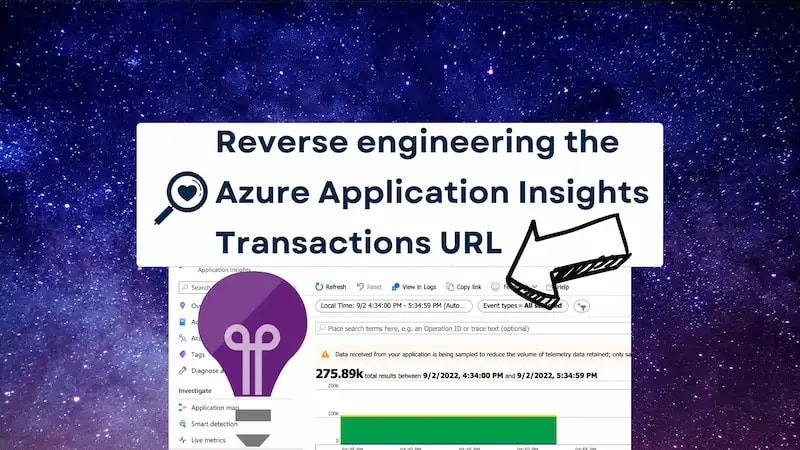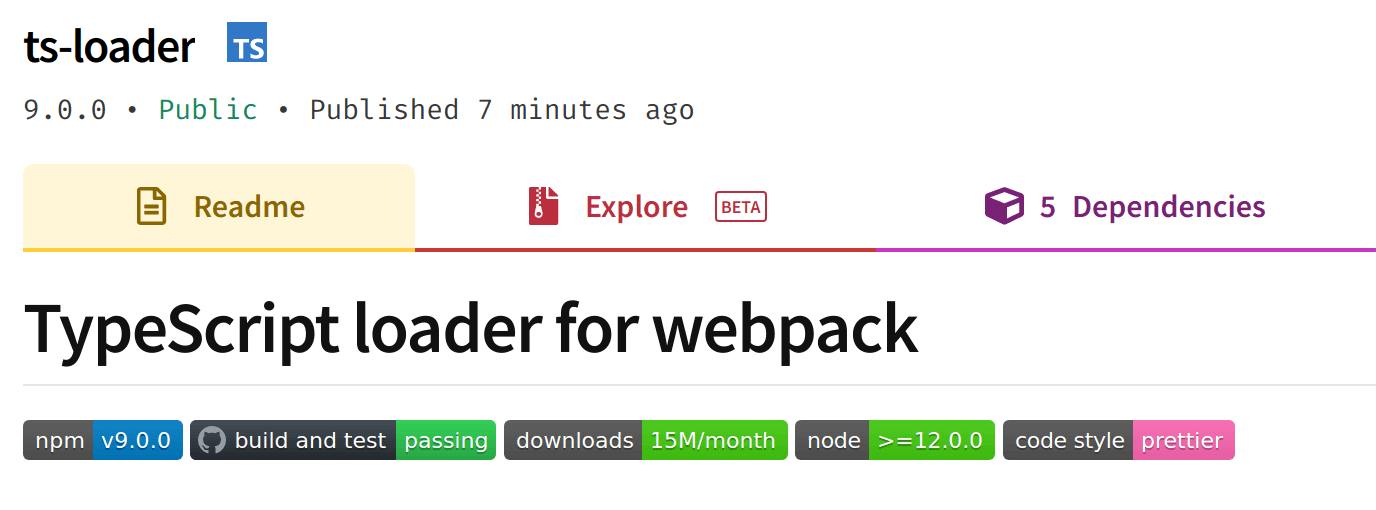81 posts tagged with "TypeScript"
The TypeScript programming language.
View All TagsReact: storing state in URL with URLSearchParams
The React useState hook is a great way to persist state inside the context of a component in React. This post demonstrates a simple React hook that stores state in the URL querystring, building on top of React Routers useSearchParams hook.
Reverse engineering the Azure Application Insights Transactions URL
Logs matter. In Azure, logs generally live in Application Insights, in the Transaction Search section. This post reverse engineers the Azure Application Insights Transactions URL, and details how to construct a link to take you directly there, using both TypeScript and C#.

TypeScript 4.7 and ECMAScript Module Support
As part of the TypeScript 4.7 release comes a major upgrade to ECMAScript Module Support for Node.js. This post takes a look at what that means.

Upgrading to React 18 with TypeScript
The upgrade of the React type definitions to support React 18 involved some significant breaking changes. This post digs into that and examines what the upgrade path looks like.

Type annotations: strong types, weakly held
Recently, a new ECMAScript proposal called "Type Annotations" (originally named "Types as Comments") was revealed. The purpose is to allow type annotations to be valid JavaScript syntax. Albeit syntax that is ignored by JavaScript engines. The proposal is being worked on by Gil Tayar, Daniel Rosenwasser, Romulo Cintra, Rob Palmer, and others. Many of these people are from TypeScript community - however this proposal intentionally does not exist to benefit TypeScript alone.
TypeScript vs JSDoc JavaScript
There's a debate to be had about whether using JavaScript or TypeScript leads to better outcomes when building a project. The introduction of using JSDoc annotations to type a JavaScript codebase introduces a new dynamic to this discussion. This post will investigate what that looks like, and come to an (opinionated) conclusion.

If you'd like to learn more about setting up a codebase to be type checked with JSDoc and TypeScript, then read this guide.
Google APIs: authentication with TypeScript
Google has a wealth of APIs which we can interact with. At the time of writing, there's more than two hundred available; including YouTube, Google Calendar and GMail (alongside many others). To integrate with these APIs, it's necessary to authenticate and then use that credential with the API. This post will take you through how to do just that using TypeScript. It will also demonstrate how to use one of those APIs: the Google Calendar API.
TypeScript 4.4 and more readable code
An exciting feature is shipping with TypeScript 4.4. It has the name "Control Flow Analysis of Aliased Conditions" which is quite a mouthful. This post unpacks what this feature is, and demonstrates the contribution it makes to improving the readability of code.
TypeScript, abstract classes, and constructors
TypeScript has the ability to define classes as abstract. This means they cannot be instantiated directly, only non-abstract subclasses can be. Let's take a look at what this means when it comes to constructor usage.
React 18 and TypeScript
React 18 alpha has been released; but can we use it with TypeScript? The answer is "yes", but you need to do a couple of things to make that happen. This post will show you what to do.
Create a Pipeline with the Azure DevOps API
Creating an Azure Pipeline using the Azure DevOps REST API is possible, but badly documented. This post goes through how to do this; both using curl and using TypeScript.
If you're curious as to how to list pipelines, then check out my post on listing pipelines with the Azure DevOps API.
The Service Now API and TypeScript Conditional Types
The Service Now REST API is an API which allows you to interact with Service Now. It produces different shaped results based upon the sysparm_display_value query parameter. This post looks at how we can model these API results with TypeScripts conditional types. The aim being to minimise repetition whilst remaining strongly typed. This post is specifically about the Service Now API, but the principles around conditional type usage are generally applicable.

ts-loader goes webpack 5
ts-loader has just released v9.0.0. This post goes through what this release is all about, and what it took to ship this version. For intrigue, it includes a brief scamper into my mental health along the way. Some upgrades go smoothly - this one had some hiccups. But we'll get into that.

The definitive guide to migrating from Blogger to Docusaurus
This post documents how to migrate a blog from Blogger to Docusaurus.

NSwag: TypeScript and CSharp client generation based on an API
Generating clients for APIs is a tremendous way to reduce the amount of work you have to do when you're building a project. Why handwrite that code when it can be auto-generated for you quickly and accurately by a tool like NSwag? To quote the docs:
Create React App with ts-loader and CRACO
Create React App is a fantastic way to get up and running building a web app with React. It also supports using TypeScript with React. Simply entering the following:
Bulletproof uniq with TypeScript generics (yay code reviews!)
Never neglect the possibilities of a code review. There are times when you raise a PR and all you want is for everyone to hit approve so you can merge, merge and ship, ship! This can be a missed opportunity. For as much as I'd like to imagine my code is perfect, it's patently not. There's always scope for improvement.
Web Workers, comlink, TypeScript and React
JavaScript is famously single threaded. However, if you're developing for the web, you may well know that this is not quite accurate. There are Web Workers:
A worker is an object created using a constructor (e.g.
Worker()) that runs a named JavaScript file — this file contains the code that will run in the worker thread; workers run in another global context that is different from the current window.
If you're using Vite to build your React app, you may prefer to read this post.
Definitely Typed: The Movie
This post is a a little different from most that sit on my site. It's the story of the Definitely Typed project, of which I was an early member. It had a seismic impact on the development of TypeScript. When exchanging messages with Andrew Branch (member of the TypeScipt team), I realised it was an untold story, and perhaps I should tell it, before I forget! So I did, and this is it.
I named it "Definitely Typed: The Movie" as the name entertained me. Little did I know, that a few years later, a documentary would be made about TypeScript, and I'd be in it; in part thanks to writing this history. You can see more about that here.
For now, back to Definitely Typed...

